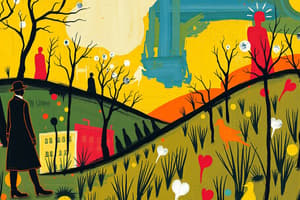Podcast
Questions and Answers
What happens in Chapter 7 of Great Expectations?
What happens in Chapter 7 of Great Expectations?
Pip lives with his guilty secret while learning reading and writing at Mrs. Wopsle's school. He befriends Biddy and is later taken to Miss Havisham's house by Pumblechook.
Why is Mr. Wopsle's great-aunt's school important?
Why is Mr. Wopsle's great-aunt's school important?
- The students excel
- It's portrayed as ridiculous (correct)
- It prepares students for university
- It provides a rigorous education
Why does Dickens use satire?
Why does Dickens use satire?
He criticizes the education system by making fun of Mr. Wopsle's great-aunt's school.
What do Pip's hands symbolize?
What do Pip's hands symbolize?
How does Dickens use imagery in Chapter 7?
How does Dickens use imagery in Chapter 7?
Provide a key quotation on Joe.
Provide a key quotation on Joe.
What is dialect?
What is dialect?
What is idiolect?
What is idiolect?
What is one of Dickens' methods to create distinct characters?
What is one of Dickens' methods to create distinct characters?
How are Miss Havisham and Joe similar?
How are Miss Havisham and Joe similar?
How are Miss Havisham and Pip alike?
How are Miss Havisham and Pip alike?
What was education like in the 19th century?
What was education like in the 19th century?
Why does Pip want to learn?
Why does Pip want to learn?
What does Mrs. Joe think about Pip's visit to Miss Havisham?
What does Mrs. Joe think about Pip's visit to Miss Havisham?
Study Notes
Chapter 7 Summary
- Pip's guilt over stealing food from the convict lingers as he struggles academically at Mrs. Wopsle's school.
- He forms a bond with Biddy, the teacher's granddaughter, and expresses a desire for education when praised by Joe.
- Joe admires a piece of Pip's writing, despite its grammatical errors, hinting at the theme of innocence versus social expectations.
- Pumblechook arranges for Pip to visit Miss Havisham, igniting hopes for Pip's future prosperity.
Mr. Wopsle’s Great-Aunt’s School
- The school is portrayed as absurd and ineffective, with the teacher existing in a 'state of coma.'
- Highlights the criticism of the 19th-century education system, where many students left without proper knowledge.
Use of Satire
- Dickens employs satire to expose flaws in the educational system through humor and exaggeration.
- Children engage in a nonsensical game instead of learning meaningful content, illustrating a lack of proper education.
Symbolism of Pip’s Hands
- Pip's hands reflect his feelings of inadequacy compared to Estella, symbolizing class differences and personal growth.
- The burning of his hands later signifies a transformative change in his character.
Imagery in the Chapter
- Death-related imagery emphasizes the decay surrounding Miss Havisham, portraying her as a lifeless figure trapped in the past.
- Pip's description of her highlights themes of mortality and stagnation.
Key Quotations on Joe
- Joe's character is presented as kind and supportive, emphasizing the friendship and loyalty between him and Pip.
- The quotes reveal Joe's understated wisdom and the warmth of his character, symbolizing unconditional love.
Understanding Dialect
- Dialect refers to regional or local speech patterns, indicating social status and education levels.
Idiolect Defined
- Idiolect represents the unique speech patterns of an individual, showcasing personal characteristics and backgrounds.
Dickens' Characterization Method
- Dickens develops unique voices for his characters through idiolect, enhancing their individuality and making them memorable.
Miss Havisham and Joe's Parallels
- Both characters serve pivotal roles in Pip's life, influencing his development and experiences.
- Joe presents a nurturing figure, while Miss Havisham introduces complexity and emotional turmoil into Pip’s journey.
Similarities between Miss Havisham and Pip
- Both characters experience emotional pain and a sense of loss, linking them through their broken hearts.
Context on 19th Century Education
- Limited access to education left half the population unable to read or write, reflecting societal inequalities.
- Most educational institutions provided only basic skills, often run by women in their homes known as 'dame schools.'
- Wealthy children received superior education, reflecting the disparity in social classes.
Pip’s Motivation to Learn
- Pip seeks knowledge as a means to elevate his social status, feeling inferior and desiring to improve himself through education.
Mrs. Joe's Perspective on Pip’s Visit
- She perceives the visit to Miss Havisham as a crucial opportunity for advancement, highlighting her ambitious expectations for Pip.
- The contrasting ambiance of Satis House underlines the tension between aspirations and the eerie reality Pip will encounter.
Studying That Suits You
Use AI to generate personalized quizzes and flashcards to suit your learning preferences.
Description
Explore the key points from Chapter 7 of 'Great Expectations' through this quiz. Pip navigates his education with the help of his friends and deals with his inner conflicts. Test your knowledge and understanding of this pivotal chapter!




